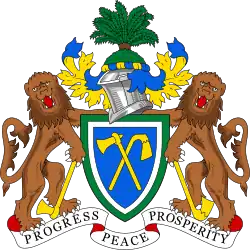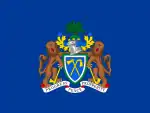List of heads of state of the Gambia
This is a list of the heads of state of the Gambia, from the independence of the Gambia in 1965 to the present day.
 |
|---|
|
|
From 1965 to 1970 the head of state under the Constitution of 1965 was the queen of the Gambia, Elizabeth II, who was also the queen of the United Kingdom and the other Commonwealth realms. The monarch was represented in the Gambia by a governor-general. The Gambia became a republic within the Commonwealth under the Constitution of 1970 and the monarch and governor-general were replaced by an executive president.
Monarch (1965–1970)
The succession to the throne was the same as the succession to the British throne.
| No. | Portrait | Name (Birth–Death) |
Reign | Royal House | Prime minister(s) | ||
|---|---|---|---|---|---|---|---|
| Reign start | Reign end | Duration | |||||
| 1 | _(cropped)_(3-to-4_aspect_ratio).jpg.webp) |
Queen Elizabeth II (1926–2022) |
18 February 1965 | 24 April 1970 | 5 years, 65 days | Windsor | Jawara |
Governor-general
The governor-general was the representative of the monarch in the Gambia and exercised most of the powers of the monarch. The governor-general was appointed for an indefinite term, serving at the pleasure of the monarch. Since the Gambia was granted independence by the Gambia Independence Act 1964, rather than being first established as a semi-autonomous dominion and later promoted to independence as defined by the Statute of Westminster 1931, the governor-general was to be always appointed solely on the advice of the Cabinet of the Gambia without the involvement of the British government, with the sole exception of John Paul, the former colonial governor, who served as governor-general temporarily until he was replaced by Farimang Mamadi Singateh. In the event of a vacancy the chief justice would have served as the officer administering the government.
- Status
| No. | Portrait | Name (Birth–Death) |
Term of office | Monarch | Prime minister(s) | ||
|---|---|---|---|---|---|---|---|
| Took office | Left office | Time in office | |||||
| 1 |  |
Sir John Paul (1916–2004) |
18 February 1965 | 9 February 1966 | 356 days | Elizabeth II | Jawara |
| 2 |  |
Sir Farimang Singateh (1912–1977) |
9 February 1966 | 24 April 1970 | 4 years, 74 days | ||
First Republic (1970–1994)
Under the Constitution of 1970, the first constitution of the Republic of the Gambia, the president replaced the monarch as executive head of state. The president was elected by the National Assembly for a five-year term. In the event of a vacancy the vice-president served as acting president.
- Status
| No. | Portrait | Name (Birth–Death) |
Elected | Term of office | Political party | ||
|---|---|---|---|---|---|---|---|
| Took office | Left office | Time in office | |||||
| 1 | .jpg.webp) |
Sir Dawda Jawara (1924–2019) |
1972 1977 1982 1987 1992 |
24 April 1970 | 22 July 1994 (deposed.) |
24 years, 89 days | People's Progressive Party |
Military rule (1994–1996)
Colonel Yahya Jammeh led a coup d'état which overthrew President Jawara and his government, all political parties and Parliament were dissolved.
| No. | Portrait | Name (Birth–Death) |
Term of office | Political party | ||
|---|---|---|---|---|---|---|
| Took office | Left office | Time in office | ||||
| 2 |  |
Colonel Yahya Jammeh (born 1965) Chairman of the AFPRC |
22 July 1994 | 6 November 1996 | 2 years, 107 days | Military |
Second Republic (1996–present)
Under the current constitution of the Republic of the Gambia, the president is executive head of state. The president is elected by popular vote for a five-year term. In the event of a vacancy, the vice-president will serve as acting president.
- Status
| No. | Portrait | Name (Birth–Death) |
Elected | Term of office | Political party | ||
|---|---|---|---|---|---|---|---|
| Took office | Left office | Time in office | |||||
| (2) |  |
Yahya Jammeh (born 1965) |
1996 2001 2006 2011 |
6 November 1996 | 19 January 2017[lower-alpha 1] | 20 years, 76 days | Alliance for Patriotic Reorientation and Construction |
| 3 | _(cropped).jpg.webp) |
Adama Barrow (born 1965) |
2016 2021 |
19 January 2017[lower-alpha 2] | Incumbent | 6 years, 280 days | Coalition 2016 (until 2019) |
| National People's Party | |||||||
Timeline since 1970

Standards
.svg.png.webp) Governor-General's standard
Governor-General's standard Presidential standard
Presidential standard
See also
Notes
- Forced to step down amidst a constitutional crisis and the ECOWAS military intervention.
- Presidency was in dispute from 19–21 January 2017.